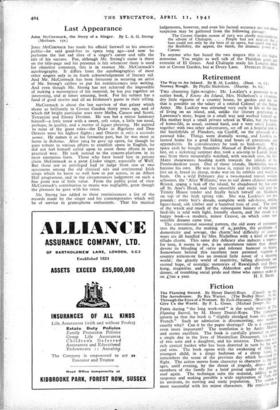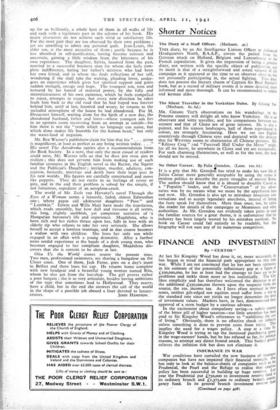Fiction
Pmus during "the long week-end" is the seedy world of Flaming Sword, by M. Henry Daniel-Rops. The 20blisher5 inform us that the book is "slightly abridged from tho original French." Such an admission is disconcerting, one wond.ers exactly why? Can it be the paper shortage? Or is it •ornethIll. even more important? The translation is by Andrci Marn! and seems excellent. The book is carefully planned to co.,: a single day in the lives of Maximilian Deaucourt, his lams of two sons and a daughter, and his mistress. Deaucourt rich cynical banker who has been deserted in turn by his and sons. The book opens with the awakening of Abcti youngest child, in a dingy bedroom of a cheap hotel; remembers the scene of the previous day which ha.:ened flight. The action moves from character to character a, the cit3; ages, until evening, by the threat of _tragedy, draw, members of the family for a brief period under the Pat';,.: roof again. The technique suits the material, adding .to suspense and making possible a wide exploration of Pans ``i; its environs, its moving and static population. The nithof _ most succesiful with his minor characters. He conjures thew
up for us brilliantly, a whole host of them in all walks of life and each with a legitimate part in the scheme of his book. His major characters do not achieve such vivid or satisfactory life. For the most part they are too obsessed by their own problems ; yet are unwilling to admit any personal guilt. Jean-Louis, the elder son, is the most attractive of them ; partly because he is less absorbed in self-justification, having become tolerant and uncertain, gaining a little wisdom from the bitterness of his own experience. The daughter, Sylvia, haunted from the past, married to a successful business man for whom she feels com- plete indifference, hating her father's mistress who had been her own friend, and in whom she finds reflections of her self, wondering if she shall take the waiting, pleading lover, under- goes an experience which gives her spiritual support and gains sudden strength, energy and hope. The youngest son, torn and tortured by his hatred of material power, by the folly and meretriciousness of his own existence, which he feels compelled to reject, attempts to escape, but every new direction he takes leads him back to the old road that he had hoped was forever behind him, until at last, haunted and weary, he returns to the secluded atmosphere of the house he had abandoned. For M. Deaucourt himself, waiting alone for the bjrth of a new day, the abandoned husband, father and lover—whose youngest son lies in an upstairs room recovering from an attempt at suicide—for him there is not the "truth which no language can name, but which alone makes life bearable for the human heart," but only the waste-land of negation.
Mr. Rex Warner's publishers' claim for him that his " . . . prose is magnificent, at least as perfect as any being written today. . . ." His novel The Aerodrome carries also a recommendation from the Book Society. In a note, that only the most casual of readers could miss, Mr. Warner tells us that he does not even aim at realism ; this does not prevent him from making use of such familiar creatures in the English novel as the Rector, the Squire and the Publican's Daughter ; intrigue, murder, adultery, con- ception, bastardy, marriage and death have their large part in his new worlds. His figures are carefully constructed and move like puppets. They do not excite in us feelings of terror or pity, and in the end their problem is solved by the simple, if not fortuitous, expedient of an aeroplane-crash.
The world of Mr. Zsolt van Harsanyi's novel Through the Eyes of a Woman seems a leisurely, faded, almost Edwardian one ; where papas call adolescent daughters " Puss " and "Lambkin." Edwin and Willa Muir have made the translation, which reads smoothly, but how dull and tiresome it all seems, this long, slightly snobbish, yet competent narrative of -"a Hungarian baroness's life and experience. Magdaleria, who is born rich and has riches thrust upon her, falls in love with an elderly rip who refuses to take her very seriously. She allows herself to accept a loveless marriage, 'and in due course becomes a widow with two children. She loses her only son while engaged in an affair with a young dramatist. After a further more sordid experience at the hapds of a drab young man, who becomes engaged to her compliant daughter, Magdalena dis- covers that she is content to be alone at last.
Give Us the World comes nearer the present time. Two men, professional swimmers, are sharing a bungalow on the Ulster coast. One of them, Jack Fame, goes on a day's jaunt to Belfast and there loses his cap. He returns home complete with new headgear and a beautiful young woman named Rita, whom he also got from the hat-shop. The girl proves rather a poor bargain ; she is so very articulate, besides having ambitions of the type that sometimes lead to Hollywood. They marry, have a child, but in the end she answers the call of the world in the shape of a possible job aboard a liner devoted to luxury-































 Previous page
Previous page